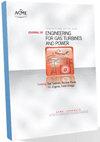利用时间序列模型增强机器学习在燃气轮机预测中的应用
IF 2.1
4区 工程技术
Q3 ENGINEERING, MECHANICAL
Journal of Engineering for Gas Turbines and Power-transactions of The Asme
Pub Date : 2023-10-17
DOI:10.1115/1.4063459
引用次数: 0
摘要
摘要本研究基于联合循环重型燃气轮机的时序数据。为了进行分析,首先,假设变量之间的关联具有稀疏性,构建了电厂标称运行的多阶段向量自回归模型,并以此作为异常检测和预测的基础。该预测结果与含异常的工厂运行时间序列数据进行了比较。讨论了基于预测精度的比较优势和算法的后处理适用性。其次,对残差的长记忆行为进行建模,并从广义加性模型的残差中观察到异质方差。采用自回归分数积分移动平均(ARFIMA)和广义自回归条件异方差(GARCH)模型对残差过程进行拟合,显著提高了预测效果。研究了滚动一步超前预报。对叶片路径温度的突变和趋势进行了数值实验,以评估预测的特异性和敏感性。在合理的信噪比下,预测灵敏度高,假阳性率低。控制图能够快速检测出模拟的突跳。本文章由计算机程序翻译,如有差异,请以英文原文为准。
Prediction Enhancement of Machine Learning Using Time Series Modeling in Gas Turbines
Abstract This study is based on time-series data taken from the combined cycle heavy-duty utility gas turbines. For analysis, first a multistage vector autoregressive model is constructed for the nominal operation of the powerplant assuming sparsity in the association among variables and this is used as a basis for anomaly detection and prediction. This prediction is compared with the time-series data of the plant-operation containing anomalies. The comparative advantage based on prediction accuracy and applicability of the algorithms is discussed for the postprocessing. Next, the long-memory behavior of residuals is modeled, and heterogeneous variances are observed from the residuals of the generalized additive model. Autoregressive fractionally integrated moving average (ARFIMA) and generalized autoregressive conditional heteroskedasticity (GARCH) models are employed to fit the residual process, which significantly improve the prediction. Rolling one-step-ahead forecast is studied. Numerical experiments of abrupt changes and trend in the blade-path temperature are performed to evaluate the specificity and sensitivity of the prediction. The prediction is sensitive given reasonable signal-to-noise ratio and has lower false positive rate. The control chart is able to detect the simulated abrupt jump quickly.
求助全文
通过发布文献求助,成功后即可免费获取论文全文。
去求助
来源期刊
CiteScore
3.80
自引率
20.00%
发文量
292
审稿时长
2.0 months
期刊介绍:
The ASME Journal of Engineering for Gas Turbines and Power publishes archival-quality papers in the areas of gas and steam turbine technology, nuclear engineering, internal combustion engines, and fossil power generation. It covers a broad spectrum of practical topics of interest to industry. Subject areas covered include: thermodynamics; fluid mechanics; heat transfer; and modeling; propulsion and power generation components and systems; combustion, fuels, and emissions; nuclear reactor systems and components; thermal hydraulics; heat exchangers; nuclear fuel technology and waste management; I. C. engines for marine, rail, and power generation; steam and hydro power generation; advanced cycles for fossil energy generation; pollution control and environmental effects.

 求助内容:
求助内容: 应助结果提醒方式:
应助结果提醒方式:


